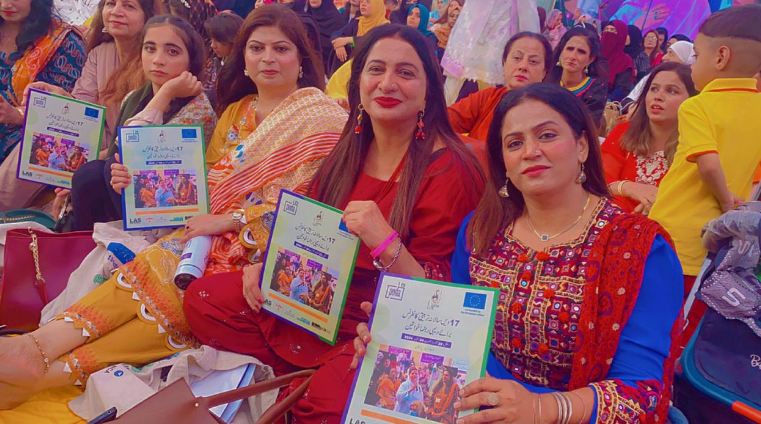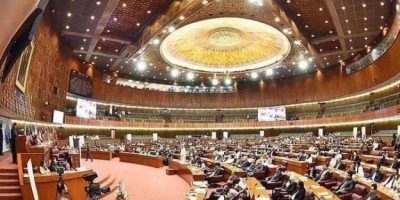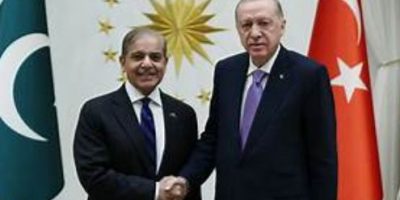Empowering Rural Women: PODA’s 17th Annual Leadership Training Conference Kicks Off in Islamabad

1st Day of 3-Day Annual Rural Women Leadership Training Conference
ISLAMABAD, OCT 22 /DNA/ – On the first day of PODA’s 17th Annual Rural Women Leadership Training Conference, women from over 132 districts nationwide, including the four provinces and the regions of Gilgit-Baltistan and AJK, united to advocate for the recognition of women as “farmers.” The fundamental focus of Tuesday’s proceedings was to bring the issues facing rural women to the forefront, ensuring that they can benefit from government policies and services. Lok Virsa collaborated with PODA to organize the 3-day conference on its premises.
Prime Minister’s Coordinator for Climate Change and Environmental Coordination, Ms. Romina Khurshid Alam, called for the empowerment of women to address climate change challenges while praising their contributions in agriculture, the economy, and other fields. Ms. Alam urged all provincial governments to take steps toward empowering women and improving healthcare, particularly focusing on the rights of girls and women in rural areas. She commended the resilience of rural women in the face of challenges, emphasizing that their participation in decision-making processes and empowerment will positively impact the overall plight of women across the country.
Ms. Alam informed the women leaders that the federal government has launched a program in Balochistan titled “She Power,” in collaboration with the Chinese government, aimed at improving health and hygiene conditions for girls and women. She stated that women’s empowerment will have far-reaching impacts on the country’s economy, agriculture, and climate change issues.
While welcoming the women leaders, Ms. Sameena Nazir, Executive Director of PODA, informed them that women make up around 60 percent of the agricultural labor force in Pakistan. However, research indicates that if these women had equal access to productive resources as men, they could increase farm yields by 20 to 30 percent, leading to a rise in total agricultural output in the country by 2.5 to 4 percent. This improvement could help reduce hunger and poverty while enhancing the quality of life for women, who are the backbone of the agricultural sector, she said.
In a message, Prime Minister Muhammad Nawaz Sharif commended the women participants for highlighting the progress and development of rural women. He emphasized that rural women play a crucial role in ensuring food security, maintaining agricultural sustainability, protecting the environment, and significantly contributing to the health and education sectors. He also reiterated his government’s commitment to providing an enabling environment for all women and girls, particularly in rural areas, ensuring they have access to quality education, health services, vocational and professional training, and sustainable livelihoods.
Director General of Population Welfare, Punjab, Ms. Saman Rai, appreciated PODA for its efforts in organizing an impactful gathering where women could come together to share their experiences, strengthen their leadership skills, and advocate for their rights in the agricultural sector. “It’s a wonderful platform for imparting information, knowledge, and skills,” she added.
Ms. Rai also visited the stalls and praised PODA for providing training to women in olive production, thereby creating opportunities for their economic empowerment.
Other prominent speakers included: Ms. Rahila Hameed Durrani, Minister for Women Development, Balochistan;MPA Uzma Kardar, CM-Punjab’s Focal Person for Polio; MPA Advocate Kanwal Liaquat, Parliamentary Secretary for Environment Protection and Climate Change and Member of the Women Protection Authority, Punjab; Ms. Farah Naz Akber, Parliamentary Secretary, National Heritage and Culture Division; Dilshad Bano, Minister for Social Welfare and Women Development of Gilgit-Baltistan; Ms. Samina Fazil, President of the Islamabad Women’s Chamber of Commerce and Industry; and Akeela Naz, representing women farmers of South Punjab.
During the second session of the day on “Empowering Rural Women Through Sustainable Innovations, Digital Entrepreneurship, and Climate Action: Challenges and Opportunities,” children from Zameer Akhtar School in Rawalpindi delivered an engaging educational theater performance that depicted the practices contributing to the devastating impacts of climate change on people’s lives. They also emphasized the importance of saving the ozone layer and the Earth by adopting habits such as using cloth bags.
During the strategic session, the panelists discussed the pressing challenges of climate change and the significant vulnerabilities rural women in Pakistan face due to these challenges. The participants agreed that despite their crucial role in food production, they often lack access to essential resources, technical bio-sciences information, and decision-making opportunities. Rural women also experience gaps in digital literacy that limit their entrepreneurial potential. They were of the opinion that by integrating climate-resilient practices and empowering women through knowledge and technology, community resilience and confidence in women farmers can be fostered.
Women from all provinces showcased their folk songs and dances, highlighting the strength of diversity that is a hallmark of Pakistan as a federation.
Related News

PM invites lawmakers, party chiefs for in-camera briefing on regional conflict
ISLAMABAD, MAR 3: Prime Minister Shahbaz Sharif has invited parliamentary leaders and heads of politicalRead More

Türkiye, Pakistan join forces for Middle East peace
ISLAMABAD, MAR 3 /DNA/ – In a high-stakes telephone conversation tonight, Prime Minister Shehbaz SharifRead More


Comments are Closed